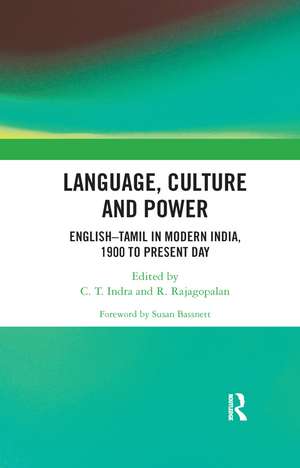Language, Culture and Power: English–Tamil in Modern India, 1900 to Present Day
Editat de C. T. Indra, R. Rajagopalanen Limba Engleză Paperback – 12 dec 2019
This interface between English and Tamil acted as a conduit for cultural transmission among different groups. The essays in this volume explore the symbiotic relation between English and Tamil during the late colonial and postcolonial as also the modernist and the postmodernist periods. The book showcases the modernity of contemporary Tamil culture as reflected in its literary and artistic productions — poetry, fiction, short fiction and drama — and outlines the aesthetics, philosophy and methodology of these translations.
This volume and its companion (which looks at the period between 1750 to 1900 CE) cover the late colonial and postcolonial era and will be of interest to students, scholars and researchers of translation studies, literature, linguistics, sociology and social anthropology, South Asian studies, colonial and postcolonial studies, literary and critical theory as well as culture studies.
| Toate formatele și edițiile | Preț | Express |
|---|---|---|
| Paperback (1) | 259.98 lei 6-8 săpt. | |
| Taylor & Francis – 12 dec 2019 | 259.98 lei 6-8 săpt. | |
| Hardback (1) | 1000.27 lei 6-8 săpt. | |
| Taylor & Francis – 13 noi 2017 | 1000.27 lei 6-8 săpt. |
Preț: 259.98 lei
Preț vechi: 311.41 lei
-17% Nou
Puncte Express: 390
Preț estimativ în valută:
49.75€ • 51.84$ • 41.19£
49.75€ • 51.84$ • 41.19£
Carte tipărită la comandă
Livrare economică 03-17 aprilie
Preluare comenzi: 021 569.72.76
Specificații
ISBN-13: 9780367886837
ISBN-10: 0367886839
Pagini: 248
Dimensiuni: 138 x 216 mm
Greutate: 0.45 kg
Ediția:1
Editura: Taylor & Francis
Colecția Routledge India
Locul publicării:Oxford, United Kingdom
ISBN-10: 0367886839
Pagini: 248
Dimensiuni: 138 x 216 mm
Greutate: 0.45 kg
Ediția:1
Editura: Taylor & Francis
Colecția Routledge India
Locul publicării:Oxford, United Kingdom
Public țintă
PostgraduateCuprins
Contributors. Foreword. Preface. Acknowledgements. Introduction 1. Toward a Third language: Translating Classical Tamil Poetry 2.The Rhetoric of Spontaneity: Translation of Bhakti Literature 3. The Role of Little Magazines: Translating Literary Texts and Texts on Literary Criticism from English to Tamil 1900–2000 4. Translating Theory and Conceptualising Subjectivity in the 1990s in Tamil Nadu 5. Cultural Empowerment and Translation: A Study of Post-1970 Ventures from Tamil to English 6. Mapping the Nuances of Language 7. Conclusion. Afterword. Bibliography
Notă biografică
C. T. Indra is former Professor of English and former Chair of the Department of English, University of Madras, Chennai, Tamil Nadu, India where she taught for over three decades. She was member of the Curriculum Development Council of UGC for English. She was the recipient of the British Council Translation award (1988) and the Katha award (1994). She was Coordinator and one of the translators in the British Council-sponsored project Representations of the West in South Indian short stories, subsequently published as Routes (2000). Her translations from Tamil include Legend of Nandan (Indira Parthasarathy’s play, 2003), Cross Section (Sivakami’s novel, 2014, with Prema Jagannathan).
R. Rajagopalan is former Reader in English, Presidency College, Chennai, Tamil Nadu, India and has served in state government educational institutions. He writes short stories and poetry in Tamil and translates as well. He has received the Tiruppur Tamil Chankam poetry award and Thisai Ettum translation award. He was associated with and contributed to leading little magazines in Tamil such as ‘Zha’, ‘Gavanam’, besides ‘Kachadathapara’. He has republished Krupabai Satthianadhan’s pioneering feminist novels Kamala and Saguna. He was part of the Tamil group and one of the translators for the British Council project published as Routes (2000). He has edited the works of modernist Tamil poets such as Gnanakoothan, Atmanam, Nakulan, Anand and Devathachan, and has authored a collection each of poetry, short stories and literary articles apart from children’s books.
R. Rajagopalan is former Reader in English, Presidency College, Chennai, Tamil Nadu, India and has served in state government educational institutions. He writes short stories and poetry in Tamil and translates as well. He has received the Tiruppur Tamil Chankam poetry award and Thisai Ettum translation award. He was associated with and contributed to leading little magazines in Tamil such as ‘Zha’, ‘Gavanam’, besides ‘Kachadathapara’. He has republished Krupabai Satthianadhan’s pioneering feminist novels Kamala and Saguna. He was part of the Tamil group and one of the translators for the British Council project published as Routes (2000). He has edited the works of modernist Tamil poets such as Gnanakoothan, Atmanam, Nakulan, Anand and Devathachan, and has authored a collection each of poetry, short stories and literary articles apart from children’s books.
Recenzii
‘The account of history of English-Tamil translation brought to light in the two volumes of this important work reinforces the fact that at different points of development, translation is of very different significance. Tellingly, Volume 1 is entitled Culture, Language and Identity, while in Volume 2 the focus shifts to Language, Culture and Power.’
Susan Bassnett FRSL, Professor of Comparative Literature, University of Glasgow; Professor Emerita and Special Advisor in Translation Studies, School of Modern Languages and Cultures, University of Warwick; and President, British Comparative Literature Association
Susan Bassnett FRSL, Professor of Comparative Literature, University of Glasgow; Professor Emerita and Special Advisor in Translation Studies, School of Modern Languages and Cultures, University of Warwick; and President, British Comparative Literature Association
Descriere
This volume examines the relationship between language and power across cultural boundaries, evaluating vital roles of translation in redefining culture and ethnic identity. The essays in this volume explore the symbiotic relation between English and Tamil during the late colonial and postcolonial as also the modernist and the postmodernist
